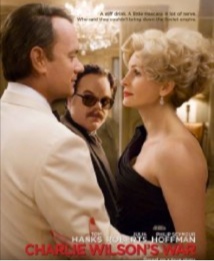Official Washington's conventional wisdom about Afghanistan derives to a dangerous degree from a Hollywood movie, "Charlie Wilson's War," which depicted the anti-Soviet war of the 1980s as a fight pitting good "freedom fighters" vs. evil "occupiers" and which blamed Afghanistan's later descent into chaos on feckless U.S. politicians quitting as soon as Soviet troops left in 1989.
The Tom Hanks movie also pushed the theme that the war was really the pet project of a maverick Democratic congressman from Texas, Charlie Wilson, who fell in love with the Afghan mujahedeen after falling in love with a glamorous Texas oil woman, Joanne Herring, who was committed to their anti-communist cause.
However, "Charlie Wilson's War" -- like many Hollywood films -- took extraordinary license with the facts, presenting many of the war's core elements incorrectly. That in itself might not be a serious problem, except that key U.S. policymakers have cited these mythical "facts" as lessons to guide the current U.S. military occupation of Afghanistan.
The degree to which Ronald Reagan's White House saw Wilson as more puppet than puppet-master is underscored by a newly discovered document at Reagan's presidential library in Simi Valley, California. I found the document in the files of former CIA propaganda chief Walter Raymond Jr., who in the 1980s oversaw the selling of U.S. interventions in Central America and Afghanistan from his office at the National Security Council.
The handwritten note to Raymond appears to be initialed by then-Deputy National Security Adviser Robert McFarlane and instructs Raymond to recruit Wilson into the Reagan administration's effort to drum up more Afghan war money for the fiscal 1985 budget. The note reads:
"Walt, Go see Charlie Wilson (D-TX). Seek to bring him into circle as discrete Hill connection. He can be very helpful in getting money. M."
Raymond appears to have followed up those instructions, as Wilson began to play a bigger and bigger role in unleashing the great Afghan spending spree of 1985 and as Raymond asserted himself behind the scenes on how the war should be sold to the American people.
Raymond, a 30-year veteran of CIA clandestine services, was a slight, soft-spoken New Yorker who reminded some of a character from a John le Carre spy novel, an intelligence officer who "easily fades into the woodwork," according to one Raymond acquaintance. But his CIA career took a dramatic turn in 1982 when he was reassigned to the NSC.
At the time, the White House saw a need to step up its domestic propaganda operations regarding President Reagan's desire to intervene more aggressively in Central America and Afghanistan. The American people -- still stung by the agony of the Vietnam War -- were not eager to engage in more foreign adventures.
So, Reagan's team took aim at "kicking the Vietnam Syndrome" mostly by wildly exaggerating the Soviet threat. It became crucial to convince Americans that the Soviets were on the rise and on the march, though in reality the Soviets were on the decline and eager for accommodations with the West.
Yet, as deputy assistant secretary to the Air Force, J. Michael Kelly, put it, "the most critical special operations mission we have ... is to persuade the American people that the communists are out to get us."
The main focus of the administration's domestic propaganda was on Central America where Reagan was arming right-wing military juntas engaged in anti-leftist extermination campaigns. Through the CIA, Reagan also was organizing a drug-tainted terrorist operation known as the Contras to overthrow Nicaragua's leftist Sandinista government.
To hide the ugly realities and to overcome popular opposition to the policies, Reagan granted CIA Director William Casey extraordinary leeway to engage in CIA-style propaganda and disinformation aimed at the American people, the sort of project normally reserved for hostile countries. To oversee the operation -- while skirting legal bans on the CIA operating domestically -- Casey moved Raymond from the CIA to the NSC staff.
Raymond formally resigned from the CIA in April 1983 so, he said, "there would be no question whatsoever of any contamination of this." But from the beginning, Raymond fretted about the legality of Casey's involvement. Raymond confided in one memo that it was important "to get [Casey] out of the loop," but Casey never backed off and Raymond continued to send progress reports to his old boss well into 1986.
It was "the kind of thing which [Casey] had a broad catholic interest in," Raymond shrugged during a deposition given to congressional Iran-Contra investigators in 1987. Raymond offered the excuse that Casey undertook this apparently illegal interference in domestic politics "not so much in his CIA hat, but in his adviser to the president hat."
Raymond also understood that the administration's hand in the P.R. projects must stay hidden, because of other legal bans on executive-branch propaganda. "The work down within the administration has to, by definition, be at arms length," Raymond noted in an Aug. 29, 1983, memo.
As one NSC official told me, the campaign was modeled after CIA covert operations abroad where a political goal is more important than the truth. "They were trying to manipulate [U.S.] public opinion ... using the tools of Walt Raymond's trade craft which he learned from his career in the CIA covert operation shop," the official said.
(Note: You can view every article as one long page if you sign up as an Advocate Member, or higher).






